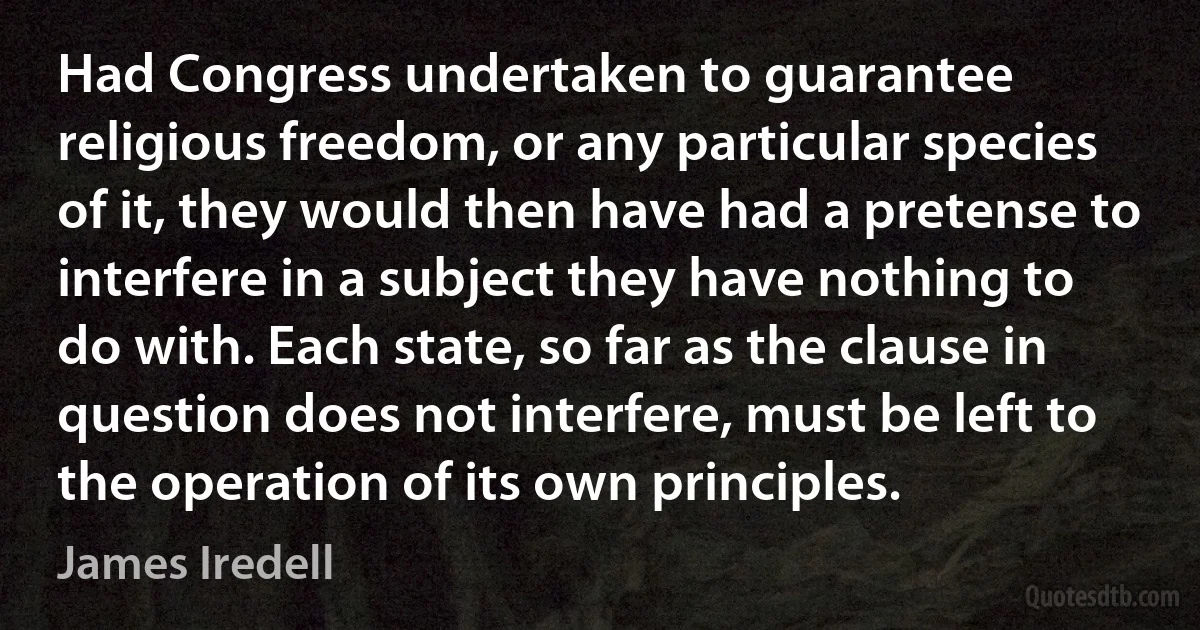Species Quotes - page 51
Prohibition will work great injury to the cause of temperance. It is a species of intemperance within itself, for it goes beyond the bounds of reason in that it attempts to control a man's appetite by legislation, and makes a crime out of things that are not crimes. A Prohibition law strikes a blow at the very principles upon which our government was founded.

Abraham Lincoln
We think Slavery a great moral wrong, and while we do not claim the right to touch it where it exists, we wish to treat it as a wrong in the Territories, where our votes will reach it. We think that a respect for ourselves, a regard for future generations and for the God that made us, require that we put down this wrong where our votes will properly reach it. We think that species of labor an injury to free white men - in short, we think Slavery a great moral, social and political evil, tolerable only because, and so far as its actual existence makes it necessary to tolerate it, and that beyond that, it ought to be treated as a wrong.

Abraham Lincoln
[T]he first characteristic of the human species is man's ability, as a rational being, to establish character for himself, as well as for the society into which nature has placed him. This ability, however, presupposes an already favorable natural predisposition and an inclination to the good in man, because the evil is really without character.

Immanuel Kant
We imagine that hardness, violence, slavery, peril in the street and in the heart, concealment, Stoicism, temptation, and deviltry of every sort, everything evil, frightful, tyrannical, raptor- and snake-like in man, serves as well for the advancement of the species "man" as their opposite.

Friedrich Nietzsche
It is true that there are men who, on the approach of severe pain, hear the very opposite call of command, and never appear more proud, more martial, or more happy than when the storm is brewing; indeed, pain itself provides them with their supreme moments! These are the heroic men, the great pain-bringers of mankind: those few and rare ones who need just the same apology as pain generally - and verily, it should not be denied them. They are forces of the greatest importance for preserving and advancing the species, be it only because they are opposed to smug ease, and do not conceal their disgust at this kind of happiness.

Friedrich Nietzsche
The homogenizing of European man ... requires a justification: it lies in serving a higher sovereign species that stands upon the former which can raise itself to its task only by doing this. Not merely a master race whose sole task is to rule, but a race with its own sphere of life, with an excess of strength ... strong enough to have no need of the tyranny of the virtue-imperative.

Friedrich Nietzsche
Every system which endeavours, either, by extraordinary encouragements, to draw towards a particular species of industry a greater share of the capital of the society than what would naturally go to it; or, by extraordinary restraints, to force from a particular species of industry some share of the capital which would otherwise be employed in it; is in reality subversive of the great purpose which it means to promote.

Adam Smith
Language, that is to say, is the indispensable mechanism of human life -- of life such as ours that is molded, guided, enriched, and made possible by the accumulation of the past experience of members of our own species. Dogs and cats and chimpanzees do not, so far as we can tell, increase their wisdom, their information, or their control over their environment from one generation to the next. But human beings do. The cultural accomplishment of the ages, the invention of cooking, [...] and the discovery of all the arts and sciences come to us as free gifts from the dead. These gifts, which none of us has done anything to earn, offer us not only the opportunity for a richer life than our forebears enjoyed but also the opportunity to add to the sum total of human achievement by our own contributions, however small they may be.

S. I. Hayakawa
At one level, this movement on behalf of oppressed farm animals is emotional ... Yet the movement is also the product of a deep intellectual ferment pioneered by the Princeton scholar Peter Singer. ... This idea popularized by Professor Singer - that we have ethical obligations that transcend our species - is one whose time appears to have come. ... What we're seeing now is an interesting moral moment: a grass-roots effort by members of one species to promote the welfare of others. ... animal rights are now firmly on the mainstream ethical agenda.

Nicholas D. Kristof
The brain is a complex system, but that doesn't mean it's incomprehensible. Our neural circuits were carved by natural selection to solve problems that our ancestors faced during our species' evolutionary history. Your brain has been molded by evolutionary pressures just as your spleen and eyes have been. And so has your consciousness. Consciousness developed because it was advantageous, but advantageous only in limited amounts.

David Eagleman



